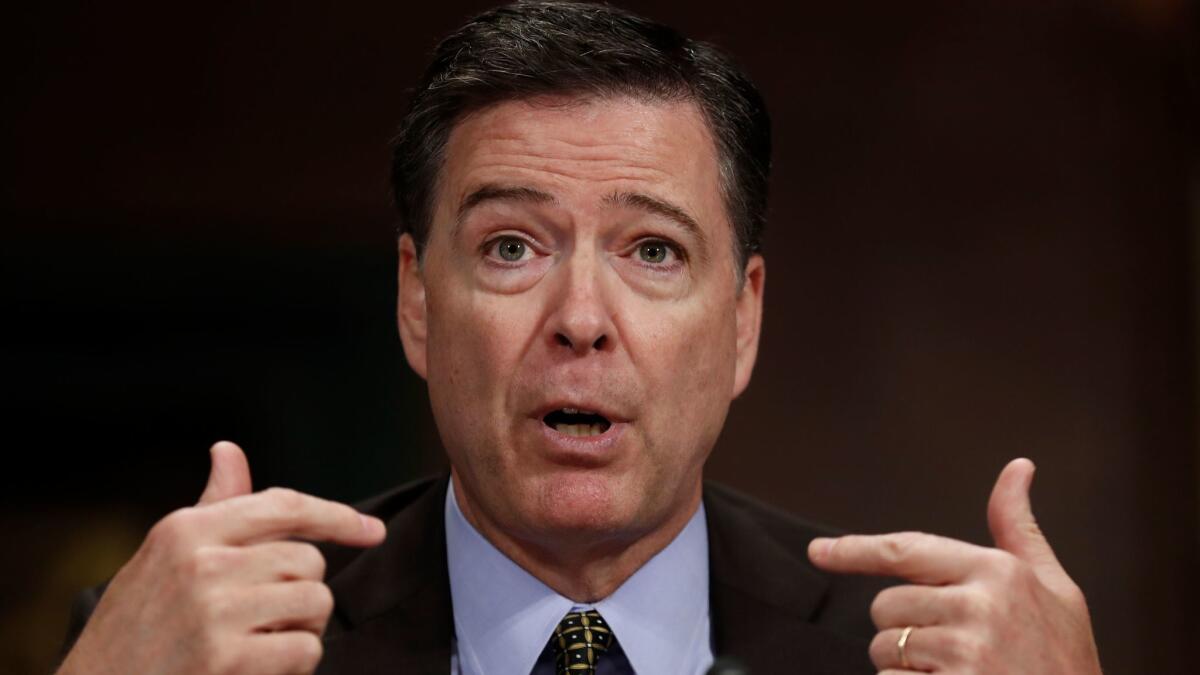Editorial: Absolutely nothing about James Comey’s firing passes the smell test

In some other universe, Americans might be able to take at face value the Trump administration’s explanation for the abrupt firing of James B. Comey less than four years into his 10-year term as director of the FBI — that Comey had mishandled the investigation into Hillary Clinton’s use of a private email server as secretary of State.
But in the real universe, that explanation seems far-fetched. After all, Comey is the official who has been supervising an investigation into possible links between Russia and the campaign of the very president who just fired him. That president, by the way, tweeted this on Monday: “The Russia-Trump collusion story is a total hoax, when will this taxpayer funded charade end?” Americans can be excused for wondering if Trump hopes that Comey’s departure from the scene is the answer to his question.
Besides, most of the conduct that supposedly led to Comey’s dismissal — detailed in a memo by Deputy Atty. Gen. Rod J. Rosenstein that was released Tuesday by the administration — has been a matter of public discussion for months and was known to Trump and Atty. Gen. Jeff Sessions when they took office.
You can be critical of some of Comey’s actions in connection with the Clinton email investigation and still be alarmed by the way he has been removed.
That includes Comey’s decision last July to hold a news conference to announce that he wasn’t recommending that Clinton be charged criminally for mishandling classified information, his characterization of her conduct as “extremely careless” and his sending of a letter to Congress 11 days before the election — which quickly became public — saying that the FBI had “learned of the existence of emails that appear to be pertinent to the investigation” into Clinton’s private email server. (Two days before the election, Comey said that the new emails hadn’t changed the FBI’s earlier conclusion.)
Even though all that information was well-known at the time, Trump told Comey in late January that he would be kept on as FBI director. So why the sudden decision to fire him now?
It’s true that in testimony before the Senate Judiciary Committee last week, Comey offered a combative defense of his actions, including a claim that when he learned of possibly relevant emails on a laptop owned by Anthony Weiner, husband of Clinton aide Huma Abedin, he faced a choice between speaking and concealing. But that argument wasn’t new either. In his memo, Rosenstein lacerates Comey for making this same argument in a letter to Congress last October.
You can be critical of some of Comey’s actions in connection with the Clinton email investigation — as this page was — and still be alarmed by the way he has been removed by a president who has his own reasons for wanting to see Comey gone.
Nor does the timing of the dismissal seem to be explained by the fact that Rosenstein, a respected career prosecutor, only recently joined the Justice Department, having been confirmed on April 25. The department has other officials responsible for investigating misconduct, including an inspector general who was investigating Comey’s actions in connection with the Clinton investigation. There was no mention of any findings by the inspector general in the White House or Justice Department announcements.
Frankly, the Comey firing is deeply troubling, reminiscent of Richard Nixon’s forcing out of special Watergate prosecutor Archibald Cox in 1973. Like Comey, Cox was investigating the president. That infamous series of moves is known as the Saturday Night Massacre.
Now that Comey is gone there are two urgent priorities that Congress must insist on in its oversight role.
One is to preserve the integrity of the Justice Department investigation into Russian meddling in the presidential election and the possibility of collusion between Russia and members of the Trump campaign. Because Sessions has recused himself from involvement in that matter, it’s up to Rosenstein to decide whether to appoint a special counsel to direct that investigation; he should do so immediately. The integrity of the investigation is in peril. Comey had a reputation for independence, and unlike Rosenstein or Sessions, he was not appointed by Trump.
Second, it is imperative that Comey’s replacement be a professional law enforcement official with an impeccable reputation, familiarity with federal law enforcement, no taint of partisanship and no political, personal or business connection to Trump. The Senate should refuse to confirm anyone who falls short of that ideal.
Read our Trump Editorial Series
Why now? The answer is simple. There is good reason to believe that rather than grow into the job, he’ll remain the man he was on the campaign trail — impulsive, untruthful, narcissistic, ignorant of the limits on presidential power and woefully unprepared to wield it.
- Part I: Our Dishonest President
- Part II: Why Trump Lies
- Part III: Trump’s Authoritarian Vision
- Part IV: Trump’s War on Journalism
- Part V: Conspiracy Theorist in Chief
- Part VI: California Takes On Trump
Follow the Opinion section on Twitter @latimesopinionand Facebook
More to Read
A cure for the common opinion
Get thought-provoking perspectives with our weekly newsletter.
You may occasionally receive promotional content from the Los Angeles Times.










